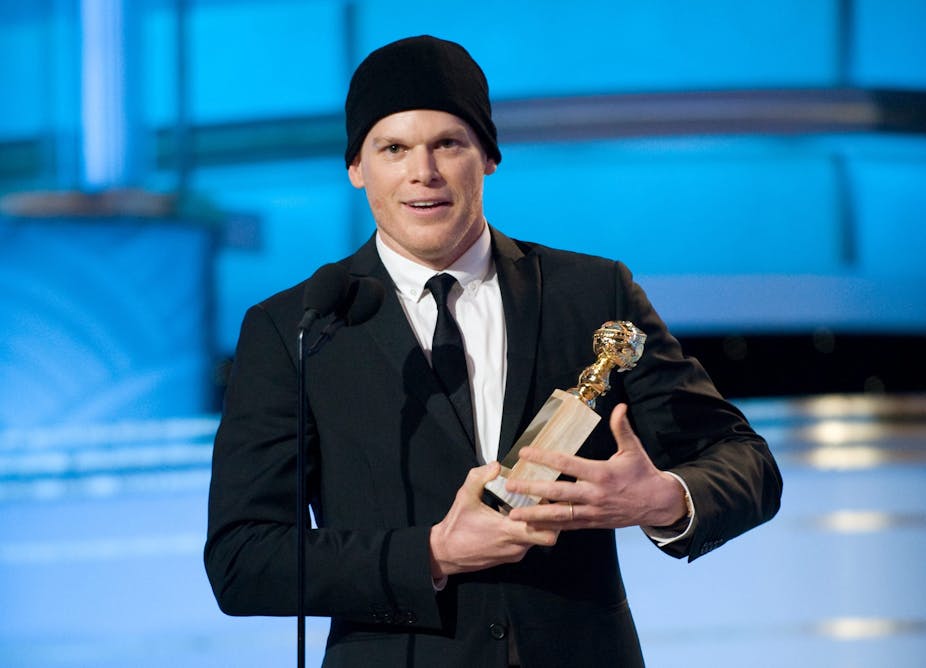On September 23, Showtime audiences will bid adieu to television’s unlikeliest hero. Since 2007, they’ve really warmed to Dexter. The show’s eponymous anti-hero is a congenial blood-spatter analyst who can decipher any crime scene. He’s a loving son, brother and father who lives by an unwavering moral code.
And he’s a mass murderer.
Fans will tune into season eight’s finale with trepidation. Most want things to work out for Dexter. But they know it can’t be so. As much as they have enjoyed breaking all the rules of TV drama, the producers have warned there’s no happy ending for a serial killer.
Whatever happens, the show has challenged what we think we “know” about media violence. It tells us that the industry that make this brutality, and the people who enjoy it, can be smart and creative. Dexter’s ferocity sets him apart from other screen slashers.
So what makes him so different?
Dexter’s is a democratic world. Young or old, black, white, Asian or Hispanic, wealthy or not, violence touches everyone. In the heyday of primetime broadcast TV, professional white men in the prime of their life literally got away with murder. But, for all his wit, athleticism, humour and charm, Dexter always pays a price for his crimes.
Yet the violence is the least interesting aspect of the show. The villains who end up on Dexter’s infamous table all die in the same way. The mechanics of the act aren’t important. Each killing adds complexity to the character and the narrative. Is “our hero”, for all his moral agonising, just another serial killer looking to excuse his blood lust? Fans will be debating that one for years to come.
Historically, critics have argued that television violence is only “bad” when it simplifies social reality. For years, American television dramatised a black and white world where people are either good or evil, powerful or weak. In the end, Dexter worked because it eschewed such certainties.
Showtime certainly took a risk here. When teenager Andrew Conley murdered his brother in 2010, then claimed he did it because he “felt like Dexter”, the writers confessed that they had feared such an event. Conley activated familiar anxieties about the effect of on-screen violence on impressionable audiences.
Interestingly, this story received little attention. There was a time when it would have been a bigger deal. Had Dexter’s adventures been broadcast to a mass audience, including lots of kids staying up past their bedtime, more public flak might have come his way. On Monday, however, the first Australians to (legally) discover his final fate will pay for the pleasure through Foxtel subscriptions. These folks, we assume, know what they’re in for.
Dexter’s biggest effect has been on writers and viewers who are willing to entertain innovative narratives and challenging characters. This year, American television brought us Bates Motel, which re-imagines Norman Bates (of Alfred Hitchcock’s 1960 film Psycho fame) as a likeable teen who just wants to fit in. Part horror and part Dawson’s Creek, the unexpected hit confronts viewers with the idea that although violence must be punished, it must also be understood. Dexter surely proved that this controversial idea could be made popular.

Journalists who have to deal with real murder often don’t have the same latitude. The charge that media glamourises violence now tends to be directed at the news. When pop culture magazine Rolling Stone presented alleged Boston bomber Dzhokhar Tsarnaev as an ordinary kid, they faced a wave of criticism. The event tells us how hard it is to represent the idea that mass murder isn’t motivated by pure, inexplicable evil alone, when discussing real people.
Strangely, then, cutting-edge television drama might be more politically important than it has ever been. If that’s true, then it’s a shame that far fewer of us get to see it. There’s a strong case to be made that good TV drama should be a public right, but quality TV is only available to those willing to pay extra, or break the law.
For years, societies have worried about the bad things that happen when people see graphic barbarity on-screen. After Dexter we might ask a different question: when such a challenging drama can only be enjoyed by a select few, what does society lose when people can’t hear what the tragic forensic expert had to say?
Among its many achievements, Dexter reminded us that screen violence is a bellwether for the cultural politics of television. Primetime murder used to matter because it showed us a world where anyone who wasn’t wealthy, male and white was in danger. Now, the problem is that although TV uses violence to dramatise a more complicated picture of society, not everyone gets to see it.
So, as Dexter passes into history, we might ask: should there be more violence on TV?

